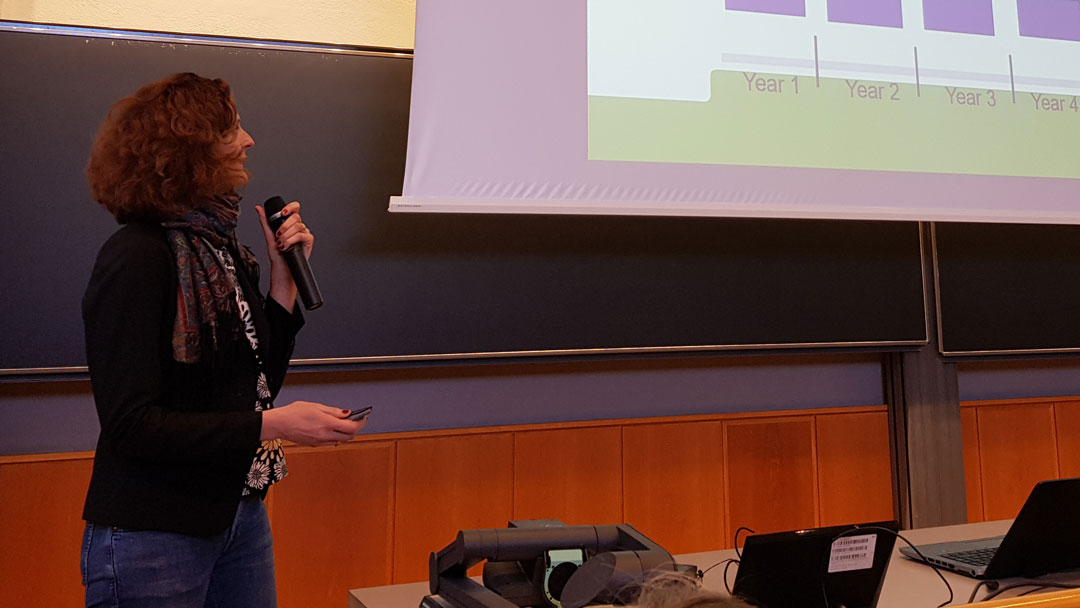EECS Teachers conference
14 January 2019

The first EECS Teachers conference of the year included presentations on Canvas, the project "Outcomes-based assessment and grading criteria" and the GRU investigation report “EECS Education Portfolio 2025”. Over hundred teachers were participating and providing great input for discussions.
Ann Lantz, Deputy Head of School and Director of First and Second Cycle Education, and Jens Zander, Head of School, opened the conference by warmly welcoming everybody and summarizing the first year of the new organization structure. It has involved GRU planning, increased quality responsibility and more long-term teacher recruitment planning.
There is also an ongoing program structure review where the final report was presented in December 2018. It is now in the phase of review and discussion. In February, the structure decision will be taken and in March the Implementation planning phase will start. The RAPP-project with all courses has now moved to Canvas, including all grading, results and notes.
Next up was Johanna Järnfeldt and Alexander Löckert from the Communications unit. Johanna showed examples of recent projects as well as suggestions on which channels to use and why. EECS-grundutbildning is the KTH Social group we use for information to teachers and gives teachers a possibility to discuss different topics.
The following presentation was held by team members of Canvas, providing the teachers with useful tips on how to use this learning management system. For example, they mentioned that a PDF can be saved as encrypted when it is not intended to be public. They also said that 60 % of the Ladok courses are now in Canvas.
After the Canvas team followed a presentation from the managers of education influence 2018 and 2019, the students Sebastian Wahlqvist and Arvid Nilsson. They explained what the advantages of a more open Canvas would be.
During and after the Canvas presentations there was a lively discussion. For example, some teachers addressed that it can be very useful to access other teachers’ courses, but time-consuming to gain this access.
The Canvas team finished by mentioning their upcoming lunch seminars at KTH for those who wish to learn more about how the system works. In April or May 2019, a larger Canvas event will take place. You can also contact it-support@kth.se when help or guidance of Canvas is needed.
After a short break, it was time for Viggo Kann to present the project “Outcomes-based assessment and grading criteria”. In short, the project sets a new definition of the meaning of the intended learning outcomes (ILO:s) of a course.
Outcome-based grading criteria have to be published in the course memo (kurs-PM) at the start of the course – and in order to pass the course each student has to fulfill all intended learning outcomes. The two important conclusions of the project are:
- “The pass level of the assessment has to be outcome-based”
- “The assessment has to be outcome-based also for higher grades”
If you want to learn more, take the course LH216V Develop the learning by using grading criteria (1.5 hp, only three meetings). to get started, held now in January and February.
Last but not least, Markus Hidell, Deputy Director of First and Second Cycle Education, and members of the working group presented the GRU investigation 2025 report .
The Summary of Proposed Actions is to:
- Introduce an EECS executive quality board
- Create a new working group for the joint EECS fundamentals
- Create a new working group for detailing the structured and flexible path packages
- Introduce programme integrating project (PIP) courses and form the teaching team who will be responsible for the courses
- Make adjustments in master programmes to adapt to the proposed year 1-3 structure
- Conduct review of specialization tracks in master programmes
For more information and slides from the conference, please visit the KTH Social group EECS-grundutbildning.
